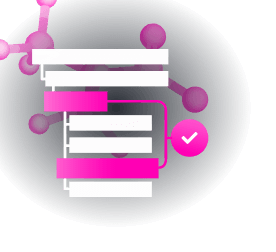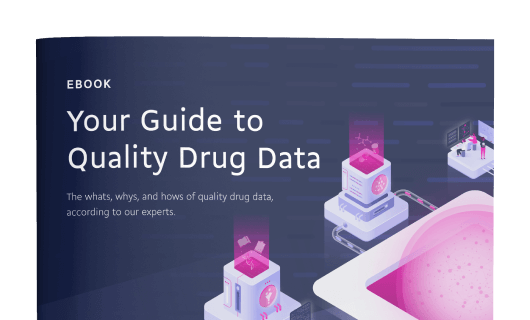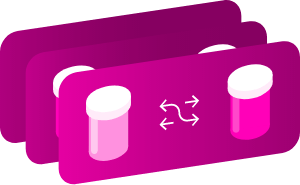Explore a selection of our essential drug information below, or:
Identification
- Summary
Axicabtagene ciloleucel is a CAR T-cell therapy used to treat adults with large B-cell lymphomas and follicular lymphoma.
- Brand Names
- Yescarta
- Generic Name
- Axicabtagene ciloleucel
- DrugBank Accession Number
- DB13915
- Background
Axicabtagene ciloleucel is an anti-CD19 chimeric antigen receptor (CAR) T-cell therapy. The drug has a unique mechanism of action, as it utilizes the patient's own T cells, which play a central role in immune response to cancer.3 Once T-cells are collected from the patient, they are genetically engineered to express anti-CD19 CARs that recognize and kill cancer cells, and are infused back into the patient.2 Each dose of axicabtagene ciloleucel represent the patient's genetically modified T-cells.4 The development of resulted from early preclinical studies conducted by a group of researchers at the National Cancer Institute (NCI), who demonstrated that T cells expressing an anti-CD19 CAR can produce cytokines that efficiently kill leukemic cells in vitro.3
Axicabtagene ciloleucel was approved by the FDA on October 18th, 2017. It is marketed under the brand name Yescarta and is used to treat large B-cell lymphomas and follicular lymphoma in adults.4 Axicabtagene ciloleucel was later approved by the EMA on August 23, 2018.5
- Type
- Biotech
- Groups
- Approved
- Biologic Classification
- Cell transplant therapies
Autologous cell transplant - Synonyms
- Autologous T cells transduced with retroviral vector encoding an anti-CD-19 CD28/CD3-zeta chimeric antigen receptor
- Axicabtagene ciloleucel
- External IDs
- KTE-C19
Pharmacology
- Indication
In the US, axicabtagene ciloleucel is indicated for the treatment of adults with large B-cell lymphoma that is refractory to first-line chemoimmunotherapy or that relapses within 12 months of first-line chemoimmunotherapy.4
In the US and Europe, it is used to treat adults with relapsed or refractory large B-cell lymphoma after two or more lines of systemic therapy, including diffuse large B-cell lymphoma (DLBCL) not otherwise specified, primary mediastinal large B-cell lymphoma, high grade B-cell lymphoma, and DLBCL arising from follicular lymphoma.4,5
Axicabtagene ciloleucel is also used to treat adults with relapsed or refractory follicular lymphoma (FL) after two or more lines of systemic therapy in the US,4 or three or more lines of systemic therapy in Europe.5
 Reduce drug development failure ratesBuild, train, & validate machine-learning modelswith evidence-based and structured datasets.Build, train, & validate predictive machine-learning models with structured datasets.
Reduce drug development failure ratesBuild, train, & validate machine-learning modelswith evidence-based and structured datasets.Build, train, & validate predictive machine-learning models with structured datasets.- Associated Conditions
Indication Type Indication Combined Product Details Approval Level Age Group Patient Characteristics Dose Form Treatment of Refractory diffuse large b cell lymphoma (dlbcl) •••••••••••• ••••• •••••••••• Treatment of Refractory diffuse large b-cell lymphoma (dlbcl) •••••••••••• ••••• •••••••••• Treatment of Refractory follicular lymphoma •••••••••••• ••••• •••••••• •• ••••• ••••• ••••• ••••• •• •••••••• ••••••• Treatment of Refractory follicular lymphoma •••••••••••• ••••• •••••••••• Treatment of Refractory large b-cell lymphoma •••••••••••• ••••• •••••••••• •• ••••••••••••• •••••••• •••••••••• •••••••••••• •••••••••• - Contraindications & Blackbox Warnings
 Prevent Adverse Drug Events TodayTap into our Clinical API for life-saving information on contraindications & blackbox warnings, population restrictions, harmful risks, & more.Avoid life-threatening adverse drug events with our Clinical API
Prevent Adverse Drug Events TodayTap into our Clinical API for life-saving information on contraindications & blackbox warnings, population restrictions, harmful risks, & more.Avoid life-threatening adverse drug events with our Clinical API- Pharmacodynamics
Axicabtagene ciloleucel transiently increases the levels of chemokines, such as IL-6, IL-8, IL-10, IL-15, TNF-α, IFN-γ, and sIL2Rα. Peak elevation was observed within the first 14 days after infusion, and levels generally returned to baseline within 28 days.4 As an off-target effect, axicabtagene ciloleucel can cause B-cell aplasia.4
- Mechanism of action
The CD 19 antigen is an integral membrane glycoprotein normally expressed in B cells during differentiation; however, it is often aberrantly expressed on B cells that have undergone a neoplastic transformation. Distinctive expression of CD19 in lymphomas and leukemias makes this glycoprotein a good immunotherapeutic target.1
Axicabtagene ciloleucel is a CD19-directed chimeric antigen receptor (CAR) T-cell therapy. It consists of genetically modified T cells of the patient receiving the immunotherapy. The manufacturing of axicabtagene ciloleucel begins with the collection of peripheral blood mononuclear cells from the patient, followed by the harvesting and genetic modification of T cells ex vivo. Retroviral transduction is used to express a CAR on T cells, creating anti-CD19 CAR T cells that are then expanded. Axicabtagene ciloleucel, a suspension of anti-CD19 CAR T cells, is infused back into the patient during treatment.4 Axicabtagene ciloleucel is made up of two components: a single-chain variable fragment targets the CD19 proteins, and there are intracellular domains - CD28 and CD3-zeta co-stimulatory domains - that signal T-cell activation.2,4 Once administered into the patient's bloodstream, axicabtagene ciloleucel recognizes the CD19-expressing target cells and the intracellular domains of the drug activate the downstream signalling cascades that lead to T-cell activation, proliferation, acquisition of effector functions, and secretion of inflammatory cytokines and chemokines that kill cancer cells.4 Axicabtagene ciloleucel binds to CD19-expressing cancer cells and normal B cells.4
Target Actions Organism AB-lymphocyte antigen CD19 antibodyHumans - Absorption
Following intravenous infusion, anti-CD19 CAR T cells rapidly expands, followed by a decline to near baseline levels by three months. Peak levels of anti-CD19 CAR T cells occurred within the first seven to 14 days following infusion.4
The median peak level of anti-CD19 CAR T cells in the blood (Cmax) was 38.3 cells/µL (range: 0.8 to 1513.7 cells/μL), which decreased to a median of 2.1 cells/µL by one month (range: 0 to 167.4 cells/μL) and to a median of 0.4 cells/µL by three months (range: 0 to 28.4 cells/μL) after drug infusion.5
- Volume of distribution
Not Available
- Protein binding
Not Available
- Metabolism
- Not Available
- Route of elimination
Not Available
- Half-life
Not Available
- Clearance
Not Available
- Adverse Effects
 Improve decision support & research outcomesWith structured adverse effects data, including: blackbox warnings, adverse reactions, warning & precautions, & incidence rates. View sample adverse effects data in our new Data Library!Improve decision support & research outcomes with our structured adverse effects data.
Improve decision support & research outcomesWith structured adverse effects data, including: blackbox warnings, adverse reactions, warning & precautions, & incidence rates. View sample adverse effects data in our new Data Library!Improve decision support & research outcomes with our structured adverse effects data.- Toxicity
There is no information regarding the LD50 and overdose of axicabatagene ciloleucel.5 Axicabatagene ciloleucel is reported to induce cytokine release syndrome (CRS) and neurotoxicity. No carcinogenicity, genotoxicity, or reproductive toxicity studies have been conducted with axicabatagene ciloleucel.4
- Pathways
- Not Available
- Pharmacogenomic Effects/ADRs
- Not Available
Interactions
- Drug Interactions
- This information should not be interpreted without the help of a healthcare provider. If you believe you are experiencing an interaction, contact a healthcare provider immediately. The absence of an interaction does not necessarily mean no interactions exist.
Drug Interaction Integrate drug-drug
interactions in your softwareAmbroxol The risk or severity of methemoglobinemia can be increased when Axicabtagene ciloleucel is combined with Ambroxol. Articaine The risk or severity of methemoglobinemia can be increased when Axicabtagene ciloleucel is combined with Articaine. Benzocaine The risk or severity of methemoglobinemia can be increased when Axicabtagene ciloleucel is combined with Benzocaine. Benzyl alcohol The risk or severity of methemoglobinemia can be increased when Axicabtagene ciloleucel is combined with Benzyl alcohol. Bupivacaine The risk or severity of methemoglobinemia can be increased when Axicabtagene ciloleucel is combined with Bupivacaine. - Food Interactions
- No interactions found.
Products
 Drug product information from 10+ global regionsOur datasets provide approved product information including:dosage, form, labeller, route of administration, and marketing period.Access drug product information from over 10 global regions.
Drug product information from 10+ global regionsOur datasets provide approved product information including:dosage, form, labeller, route of administration, and marketing period.Access drug product information from over 10 global regions.- Brand Name Prescription Products
Name Dosage Strength Route Labeller Marketing Start Marketing End Region Image Yescarta Suspension 2000000 1/68mL Intravenous Kite Pharma, Inc. 2017-10-18 Not applicable US Yescarta Suspension 120000000 Cells Intravenous Kite Pharma Eu B.V. 2020-12-22 Not applicable EU Yescarta Suspension 200000000 cells / bag Intravenous Gilead Sciences 2019-11-27 Not applicable Canada
Categories
- ATC Codes
- L01XL03 — Axicabtagene ciloleucel
- Drug Categories
- Antigens
- Antigens, CD
- Antigens, Differentiation
- Antigens, Differentiation, B-Lymphocyte
- Antigens, Surface
- Antineoplastic Agents
- Antineoplastic Agents, Immunological
- Antineoplastic and Immunomodulating Agents
- Antineoplastic cell and gene therapy
- Biological Factors
- Cancer immunotherapy
- CD19 Receptor Interactions
- CD19-directed Chimeric Antigen Receptor
- Complex Mixtures
- Genetically-modified Autologous T Cells
- Immunization
- Immunization, Passive
- Immunomodulation
- Immunotherapy
- Classification
- Not classified
- Affected organisms
- Humans and other mammals
Chemical Identifiers
- UNII
- U2I8T43Y7R
- CAS number
- Not Available
References
- General References
- Scheuermann RH, Racila E: CD19 antigen in leukemia and lymphoma diagnosis and immunotherapy. Leuk Lymphoma. 1995 Aug;18(5-6):385-97. [Article]
- Neelapu SS, Locke FL, Bartlett NL, Lekakis LJ, Miklos DB, Jacobson CA, Braunschweig I, Oluwole OO, Siddiqi T, Lin Y, Timmerman JM, Stiff PJ, Friedberg JW, Flinn IW, Goy A, Hill BT, Smith MR, Deol A, Farooq U, McSweeney P, Munoz J, Avivi I, Castro JE, Westin JR, Chavez JC, Ghobadi A, Komanduri KV, Levy R, Jacobsen ED, Witzig TE, Reagan P, Bot A, Rossi J, Navale L, Jiang Y, Aycock J, Elias M, Chang D, Wiezorek J, Go WY: Axicabtagene Ciloleucel CAR T-Cell Therapy in Refractory Large B-Cell Lymphoma. N Engl J Med. 2017 Dec 28;377(26):2531-2544. doi: 10.1056/NEJMoa1707447. Epub 2017 Dec 10. [Article]
- Roberts ZJ, Better M, Bot A, Roberts MR, Ribas A: Axicabtagene ciloleucel, a first-in-class CAR T cell therapy for aggressive NHL. Leuk Lymphoma. 2018 Aug;59(8):1785-1796. doi: 10.1080/10428194.2017.1387905. Epub 2017 Oct 23. [Article]
- FDA Approved Drug Products: YESCARTA (axicabtagene ciloleucel) suspension for intravenous infusion (December 2023) [Link]
- EMA Approved Drug Products: Yescarta (axicabtagene ciloleucel) intravenous infusion [Link]
- External Links
- PubChem Substance
- 347911476
- 1987398
- Wikipedia
- Axicabtagene_ciloleucel
Clinical Trials
- Clinical Trials
Clinical Trial & Rare Diseases Add-on Data Package
Explore 4,000+ rare diseases, orphan drugs & condition pairs, clinical trial why stopped data, & more. Preview package Phase Status Purpose Conditions Count Start Date Why Stopped 100+ additional columns Unlock 175K+ rows when you subscribe.View sample data3 Active Not Recruiting Treatment Relapsed or Refractory Diffuse Large B Cell Lymphoma (DLBCL) 1 somestatus stop reason just information to hide 3 Recruiting Treatment High-risk Large B-cell Lymphoma (LBCL) 1 somestatus stop reason just information to hide 3 Recruiting Treatment Relapsed or Refractory Follicular Lymphoma 1 somestatus stop reason just information to hide 2 Active Not Recruiting Treatment Cytokine Release Syndrome / Neurologic toxicity / Neurotoxicity Syndromes / Non-Hodgkin's Lymphoma (NHL) / Non-Hodgkin's Lymphoma, Relapsed / Refractory Non-Hodgkin's lymphoma 1 somestatus stop reason just information to hide 2 Active Not Recruiting Treatment Follicular Lymphoma ( FL) / Indolent Non Hodgkin's Lymphoma (iNHL) / Marginal Zone Lymphoma (MZL) 1 somestatus stop reason just information to hide
Pharmacoeconomics
- Manufacturers
- Not Available
- Packagers
- Not Available
- Dosage Forms
Form Route Strength Suspension Intravenous 120000000 Cells Suspension Intravenous 2000.000 cells/68ml Suspension Intravenous 2000000 1/68mL Suspension Intravenous 200000000 cells / bag - Prices
- Not Available
- Patents
- Not Available
Properties
- State
- Solid
- Experimental Properties
- Not Available
Targets

- Kind
- Protein
- Organism
- Humans
- Pharmacological action
- Yes
- Actions
- Antibody
- General Function
- Receptor signaling protein activity
- Specific Function
- Assembles with the antigen receptor of B-lymphocytes in order to decrease the threshold for antigen receptor-dependent stimulation.
- Gene Name
- CD19
- Uniprot ID
- P15391
- Uniprot Name
- B-lymphocyte antigen CD19
- Molecular Weight
- 61127.985 Da
References
- Neelapu SS, Locke FL, Bartlett NL, Lekakis LJ, Miklos DB, Jacobson CA, Braunschweig I, Oluwole OO, Siddiqi T, Lin Y, Timmerman JM, Stiff PJ, Friedberg JW, Flinn IW, Goy A, Hill BT, Smith MR, Deol A, Farooq U, McSweeney P, Munoz J, Avivi I, Castro JE, Westin JR, Chavez JC, Ghobadi A, Komanduri KV, Levy R, Jacobsen ED, Witzig TE, Reagan P, Bot A, Rossi J, Navale L, Jiang Y, Aycock J, Elias M, Chang D, Wiezorek J, Go WY: Axicabtagene Ciloleucel CAR T-Cell Therapy in Refractory Large B-Cell Lymphoma. N Engl J Med. 2017 Dec 28;377(26):2531-2544. doi: 10.1056/NEJMoa1707447. Epub 2017 Dec 10. [Article]
- Roberts ZJ, Better M, Bot A, Roberts MR, Ribas A: Axicabtagene ciloleucel, a first-in-class CAR T cell therapy for aggressive NHL. Leuk Lymphoma. 2018 Aug;59(8):1785-1796. doi: 10.1080/10428194.2017.1387905. Epub 2017 Oct 23. [Article]
- FDA Approved Drug Products: YESCARTA (axicabtagene ciloleucel) suspension for intravenous infusion (December 2023) [Link]
Drug created at October 19, 2017 15:01 / Updated at February 14, 2024 00:55

